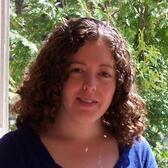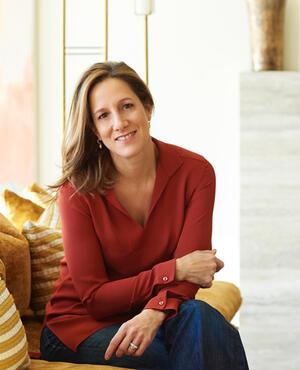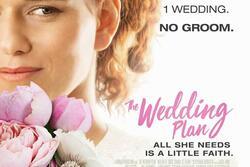Abigail Pogrebin On Her Jewish Year
Abigail Pogrebin was Jewish, but not that Jewish. That is, like many Jews she knew, she expressed her religion more through culture than through traditional practice. A few years ago, Pogrebin started wondering whether she was missing out on something important and decided to find out by celebrating eighteen Jewish holidays in twelve months.
What resulted was My Jewish Year, a funny, touching memoir about faith, family, observance, and personal growth. We're reading this book for our September Book Club pick, and so we talked to Pogrebin about how her feminist Jewish upbringing shaped this project, why she feels inclusion is essential to Jewish continuity, and the importance of family to many Jewish traditions.
What was your favorite holiday going into this, and did it shift over the course of the project?
In terms of holidays I hadn’t experienced before, it was Simhat Torah. Walking into B’nai Jeshurun, with hundreds of people dancing in circles with a book that is usually so protected, so fragile, which you only touch with a yad, not with your hands, and suddenly passing it from person to person while people dance with, and around, it for hours, I just felt like this is what Judaism should be. I did an interview before the holiday with Rabbi Asher Lopatin, the head of Yeshivat Chovevei Torah, who said that this is an incredibly inclusive holiday, because when you’re dancing with the Torah and singing, you don’t need to know all the words, a lot of it is just lai-lai-lai. And that’s such a small point but a big one, because often not knowing the words is a barrier. The accessibility of the holiday was really brought home to me.
But the holiday I had done before that was really wholly changed was Yom Kippur. I had never really seen how hard the work for atonement should be. Confronting the fragility of life without it freaking you out, noting that we don’t necessarily get another year—we don’t necessarily get another day! And in that mindset, without being maudlin about it, what do you want to do with that day, with that year? Don’t just do business as usual, that’s a missed opportunity and a missed responsibility. We owe something to other people. We should be useful. That was really clarified for me.
You discuss what it was like for you as a teen to go to feminist Seders with the luminaries of the feminist movement. Did that change how you felt growing up about women’s role in the tradition?
I didn’t grow up with the sexism that my mother did. Even now, she is a lover of Judaism and Jewish ritual, but she’s very aware of what she was barred from in her formative years. I don’t have that experience because my mother was the cantor at our makeshift synagogue in Fire Island, so I was seeing my mother sing the liturgy, knowing she was one of the few people in our community who could. That was real female empowerment. And now, to be at Central Synagogue with the first Asian-American woman rabbi, Angela Buchdahl, all of the barriers are gone. So my trajectory has been much more open, but I am also aware of the fact that there are still people who want to hear a man’s voice, because that’s what they’re used to. I’m sympathetic to it on one level because so much of Judaism is what you grew up with, and again, I grew up with a much more egalitarian model. To be twelve years old, sitting on the floor next to Gloria Steinem and Bella Abzug is not your normal childhood Seder!
Did the creativity of those feminist Seders change how much freedom you felt to create new rituals and traditions?
I think it absolutely did, but I didn’t realize it until you asked! As I say in the book, I go a little nutso trying to make the Seder come alive so that the kids can put the pieces together in their own ways. The feeling that I have permission to do that must come on some level from the feminist Seder, which was co-written by real pioneers, particularly Esther Broner. The rabbis I’ve talked to have also emboldened me. I expected more rabbis to say “This is how it’s done,” but rabbi after rabbi, teacher after teacher, said, “The Haggadah is a living, evolving document, there is no one Haggadah, it is there to be reinterpreted, rewritten.”
How did you decide which holidays to celebrate at home with your family, at your synagogue or with other communities?
It’s not always easy to know where to play out the Jewish moment. The Jewish holidays come fast and furious, especially in the fall, and it wasn’t always clear to me, should I be in synagogue right now, should I be studying. For the observant, they have their traditions to guide them. But even there, I talked to so many Orthodox rabbis who completely diverged on how they observed Tisha B’Av. It’s not like there’s this blueprint that everyone follows. I have my own Rosh Hashanah memories, my own Yom Kippur memories, but it was interesting to ask people what they do and realize there’s such a wide spectrum of how people mark these moments.
I think especially for a Manhattan-born Jew to see how people with lawns celebrate Sukkot is just such a contrast!
Very true. An ultra-Orthodox rabbi invited me to his sukkah in Staten Island, and their lawn is like a postage stamp, and their sukkah is just wedged in there. It’s powerful: people make their Judaism wherever they are, however they can.
Several times throughout the book, you mention worrying that you’re making these discoveries too late to make them part of your kids’ childhood memories. But you also discuss the impact your own mother’s late-in-life Jewish journey had on you. What do you think your kids get from seeing you making these discoveries?
I hope they absorb my excitement around what I was learning and experiencing. I can’t say that in a perfect-ending way because I don’t know how this ends, how my kids will play out their Jewish lives. But I do think they have seen how curiosity can lead you to meaning, how learning can lead to a spiritual experience, to magic. I don’t think Judaism is advertised as offering moments of magic, and people are understandably and appropriately private about when they feel it, but there are moments like that. I hope my kids have already tasted what that feels like.
I also should mention the warmth and togetherness of these holidays for my kids: having grown up with a synagogue in a way that I didn’t. It’s not just the ritual of the Seder itself, but the fact that Judaism so often puts us in a loud, raucous, full room, that that’s when the relatives come. I think that’s not lost on them, feeling like they’re part of a larger family and that Judaism makes our family expand.
One thing that comes up over and over in your book is the question of whether Jews have access to the tradition or feel shut out. What does this question of access mean for you?
With all the research and learning I’ve done, there are still moments where I feel like there’s a big spotlight on me, and I just want to throw up my hands sometimes and say, “I’m never going to learn this,” or “I’d have to put in so much more time to be this fluent in our tradition.” Even if you’re a Jew, when you walk into spaces where everyone’s singing songs you don’t know, or davening (praying) too fast for you, or maybe you don’t know the Hebrew that well, or you don’t know why we’re doing things a particular way, those are the moments where people often give up. Smart people don’t like to feel dumb.
But I think it is doable to get inside someone’s anxiety of ignorance and, without dumbing it down, make that entry point a little more accessible.








Kudos to my wonderful daughter, Abigail, for expressing complex issues with such precision, clarity, and humor. Those of you who have not yet read her book have a great treat in store no matter where you stand on the spectrum of Jewish literacy or familiarity with the holidays. I know I'm her mother but I'm completely unbiased when I say, Don't miss it!